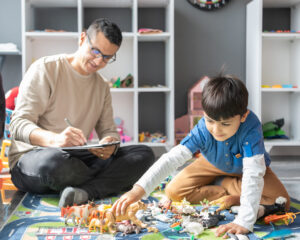How to Talk to Children About Therapy: Tips for Parents and Caregivers

If your child is about to start therapy, it’s normal to be nervous. And you probably have a lot of questions. What should you say (and what shouldn’t you say)? What if there’s conflict? How can you set the stage for your child to feel safe and confident in therapy? But the conversation doesn’t have to be a bumpy one. With a little preparation, talking to your child about starting therapy can be smooth and empowering. Learn what you can do to prepare for a great conversation with your child or teen.
Signs that a Child Might Benefit From Therapy
Life can get difficult, and it can be even more difficult for a child who’s going through a hard time and doesn’t know how to process and cope on their own. When feelings become too overwhelming, odd or difficult behaviors may happen.
Erica Herzog, LCMFT
“Children often use behaviors to express their feelings because they don’t know how to identify their specific emotions and how to cope with them,” explains Erica Herzog, Director of Outpatient Services with KVC Kansas.
 Keep in mind that some behaviors may be a sign of a normal developmental stage in a child, but if these behaviors persist for a longer period (more than a few weeks) and there is no obvious cause, then a discussion about therapy may be beneficial. Some common signs to watch out for include:
Keep in mind that some behaviors may be a sign of a normal developmental stage in a child, but if these behaviors persist for a longer period (more than a few weeks) and there is no obvious cause, then a discussion about therapy may be beneficial. Some common signs to watch out for include:
- Acting out
- Irritability
- Changes in appetite
- Sleeping difficulties
- Regressions (bed wetting after successful potty training, or reverting to baby talk, are a few examples)
- Increased anxieties
- Depression
- Withdrawing themselves from activities or people they used to enjoy
- Recent traumatic experiences: divorces, deaths, births, moving homes or other significant life transitions
Therapy can be a helpful way for children to process information and work through it with a skilled professional. And therapy doesn’t have the stigma it may have had in the past, explains Clarissa Johnson, Outpatient Therapist with KVC Kansas.
Clarissa Johnson, M.S., LCPC
“Mental health awareness is becoming more accepted now,” Johnson explains, “and caregivers can help normalize going to therapy.”
If you notice changes or think that your child would benefit from therapy, contact a mental health treatment provider or your child’s primary care doctor to discuss your concerns.
Outpatient or Inpatient Treatment: What’s Right for Your Child
Generally, two key types of therapy treatments are available to children: outpatient and inpatient therapy. Which is right for your child? The answer often depends on the severity of symptoms. Some children’s mental health providers offer both inpatient and outpatient options, while others focus solely on one or the other. Access this free guide to understand the different levels of mental health treatment available for children and teens, and which one may be right for your child.
Outpatient Therapy
Outpatient therapy offers a supportive mental health treatment environment for those who do not need round-the-clock care for safety monitoring. Children in an outpatient therapy program go about their daily routine as normal but attend regularly scheduled therapy appointments. The specific type of outpatient therapy may vary depending on your child’s age and symptoms, but most will focus on problem-solving, processing trauma and improving coping skills.
Inpatient Treatment

If the child is or could be a threat to themselves or others, then inpatient or residential treatment is needed to ensure their safety and the safety of those around them. Around-the-clock care will be available and the child has the opportunity to work with qualified professionals to address challenges while developing healthy coping and emotion regulation skills.
These professionals speak with the child to evaluate their needs and then develop an appropriate treatment plan. When the child is preparing for discharge from the inpatient treatment program, the treatment team will develop next steps to continue improving the child’s health and wellbeing after they return home.
How Parents and Caregivers Can Begin the Conversation About Therapy with a Child
Once you determine that therapy is right for your child, it’s time to start the conversation. To gain an understanding of where to start and how to go about explaining therapy and mental health, try these tips from our mental health experts, Clarissa Johnson and Erica Herzog. Keep in mind that every child will have a different level of knowledge. Some children may already have an understanding of what therapy means, while others might not be familiar with therapy at all.
Each age group might require a caregiver to provide a slightly different approach. But no matter how old your child is, it’s important for caregivers to:
- Remain honest and clear
- Choose a time when both you and your child are calm and won’t feel rushed
- Use age-appropriate language
- Allow time and space to answer questions
Tips for Talking About Therapy With Younger Children

For talking to younger children, it can help to physically get down on their level when conversing, so you’re eye-to-eye. Remain gentle and speak in a peaceful tone of voice so your child understands they’re not “in trouble.” Help them understand: a therapist is someone who helps kids and people work through big emotions.
Tips for Talking About Therapy With Older Children
The timing of the conversation is important for older children and preteens. Find a low-chaos time and setting to open this conversation. Avoid immediately before or after school, before extracurricular activities or other events. Expect that they might need some space to process after your conversation, and provide them with that.
Again, it’s important to remain gentle. Older children need affirmation and confirmation that therapy isn’t a punishment. It can help to bring up specific details, and you can share examples of how you have seen your child struggling in certain ways. Just remember to remain sensitive. And as you share examples, keep a positive, encouraging tone. Address where the child has been working hard and show that you notice their progress.
Tips for Talking About Therapy With Teens
 All the strategies for talking to older children apply here, but the conversation might be more nuanced with teens. Many teens will have at least a foundational understanding of the importance of mental health — and they’ll likely have more thoughts and input for this conversation. It’s important to remain open to their opinions.
All the strategies for talking to older children apply here, but the conversation might be more nuanced with teens. Many teens will have at least a foundational understanding of the importance of mental health — and they’ll likely have more thoughts and input for this conversation. It’s important to remain open to their opinions.
Finding Balance: What if My Child Refuses Therapy?
It can be easy for children (older children especially) to immediately dismiss the idea of therapy once it’s brought up. But by this point, the decision that therapy is needed has usually already been made. How can you minimize conflict and allow your child autonomy?
Although minimizing their fears might be an easy response, it’s important for parents and caregivers to acknowledge and not diminish any fears or concerns that children have about attending therapy. “You can avoid a power struggle by remaining encouraging and focusing on the positives,” Herzog recommends. Address the child’s concerns with love and honesty.
There are some things you can do to provide your child with a sense of ownership over their therapy experience. Consider one of these strategies:
- Offer to attend sessions together: At least until the child feels more comfortable with therapy, you can offer to stay with them during their first visit.
- Schedule a quick introductory conversation with the therapist: The first visit won’t feel as intimidating if your child has already met their therapist! This conversation is great to have before a first-time therapy session and can help alleviate anxieties. It’s also a great time for children to ask their questions directly.
- Remind your child that therapy can be fun: Try to keep the conversation lighthearted. Many therapists will utilize games, crafts, music or other methods to help improve and support coping skills in young people.
- Discuss the confidentiality of therapy: Older children in particular may worry or wonder if what they say in therapy will be shared back with you. Assure them that things discussed during their session won’t be shared with a parent unless it’s a safety concern.
Setting Expectations for the First Appointment
 As with anything new, the unknown can be scary, and starting therapy is no exception. To help mitigate any fears, caregivers can help paint a picture of what a therapy session might look like. Feel free to speak with the therapist in advance of the first session. As the first appointment is usually the one with the most anxiety, Johnson says, “Many children, especially younger ones, will bring a comfort item or favorite toy with them to their first visit.”
As with anything new, the unknown can be scary, and starting therapy is no exception. To help mitigate any fears, caregivers can help paint a picture of what a therapy session might look like. Feel free to speak with the therapist in advance of the first session. As the first appointment is usually the one with the most anxiety, Johnson says, “Many children, especially younger ones, will bring a comfort item or favorite toy with them to their first visit.”
At this first appointment, the caregiver(s) and the child will both be present. The therapist will ask questions, get to know a little bit about the child and family, and then discuss a plan of action for moving forward. This appointment is a great opportunity for the child and caregiver to open up to the therapist about what they think might be helpful, and the therapist may decide to integrate different approaches to therapy, like expressive therapies (art therapy, music therapy, play/recreational therapy or other therapies) based on their findings. Not every child will automatically click with a therapist, but everyone involved can get a feel for each other and move on if this isn’t the right fit.
Finding Help and Hope with KVC Kansas
Here at KVC, we know we all need connection. When you’re looking for therapeutic services for your child, things can feel hopeless. But we’re here to help. KVC’s licensed therapists provide quality mental healthcare by developing trust and treating the whole person. Our mental health professionals offer individual and family therapies to children and families involved in the child welfare system. We work to meet the needs of children, adolescents, and adults so they can meet their full potential at home, school, and work. Learn more about our outpatient therapy services.


